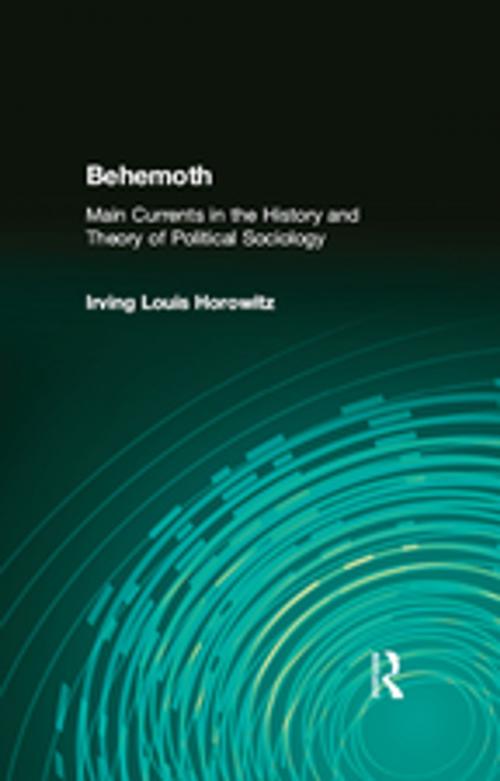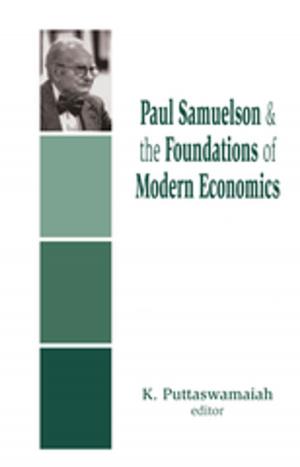Behemoth
Main Currents in the History and Theory of Political Sociology
Nonfiction, Social & Cultural Studies, Social Science, Anthropology, Sociology| Author: | Irving Horowitz | ISBN: | 9781351289740 |
| Publisher: | Taylor and Francis | Publication: | October 19, 2017 |
| Imprint: | Routledge | Language: | English |
| Author: | Irving Horowitz |
| ISBN: | 9781351289740 |
| Publisher: | Taylor and Francis |
| Publication: | October 19, 2017 |
| Imprint: | Routledge |
| Language: | English |
The title, Behemoth, derives from the Hebrew word Behemah-a beast, an enormous creature, monstrously huge and vast. It is an apt description of the State on the eve of the twenty-first century. Loved by few, vilified by many from all perspectives, it nonetheless continues to grow; by turns rivaling and co-opting that more pleasant-sounding word: Society. Political sociology aims to define and understand the interrelationship between these two huge terms: State and Society.
Continuing in a path begun by Horowitz in the 1950s in The Idea of War and Peace in Contemporary Social and Philosophical Thought, expanded upon in the 1970s with Foundations of Political Sociology, this summing up in the late 1990s is an effort to extract and evolve the canon of political sociology. Starting with Montesquieu, Horowitz proceeds through the European experience of Rousseau, Tocqueville, Hegel, Marx, Durkheim, Sorel, and Weber. He then takes the field on its tangled migration to America with the Frankfurt School in exile, followed by searching chapters on Schumpeter, Mills, Arendt, and Huntington, among others.
The result is a stunning revaluation of the intellectual sources of the present day divisions between statists and socialists, welfarists and individualists, advocates of dictatorship and of democracy, mandated rules and voluntary association, hard realists and soft utopians, a world without states and a world with a single state. Horowitz does not offer the usual evolutionary notion of doctrines, but a canon embedded in and embattled with the societies they aim to serve or overthrow in the present as in the past. The result is a major recasting of the theory and practice of social science and normative frameworks.
The final chapter offers Horowitz's own prognosis of what we can expect in the recasting of the Welfare State to include the Welfare Society, and its growing nemesis the global economy which threatens to engulf State and Society alike in a return to civilizational concerns. This is an essential text for policy-makers and social scientists interested in macroscopic changes in the political order.
The title, Behemoth, derives from the Hebrew word Behemah-a beast, an enormous creature, monstrously huge and vast. It is an apt description of the State on the eve of the twenty-first century. Loved by few, vilified by many from all perspectives, it nonetheless continues to grow; by turns rivaling and co-opting that more pleasant-sounding word: Society. Political sociology aims to define and understand the interrelationship between these two huge terms: State and Society.
Continuing in a path begun by Horowitz in the 1950s in The Idea of War and Peace in Contemporary Social and Philosophical Thought, expanded upon in the 1970s with Foundations of Political Sociology, this summing up in the late 1990s is an effort to extract and evolve the canon of political sociology. Starting with Montesquieu, Horowitz proceeds through the European experience of Rousseau, Tocqueville, Hegel, Marx, Durkheim, Sorel, and Weber. He then takes the field on its tangled migration to America with the Frankfurt School in exile, followed by searching chapters on Schumpeter, Mills, Arendt, and Huntington, among others.
The result is a stunning revaluation of the intellectual sources of the present day divisions between statists and socialists, welfarists and individualists, advocates of dictatorship and of democracy, mandated rules and voluntary association, hard realists and soft utopians, a world without states and a world with a single state. Horowitz does not offer the usual evolutionary notion of doctrines, but a canon embedded in and embattled with the societies they aim to serve or overthrow in the present as in the past. The result is a major recasting of the theory and practice of social science and normative frameworks.
The final chapter offers Horowitz's own prognosis of what we can expect in the recasting of the Welfare State to include the Welfare Society, and its growing nemesis the global economy which threatens to engulf State and Society alike in a return to civilizational concerns. This is an essential text for policy-makers and social scientists interested in macroscopic changes in the political order.















